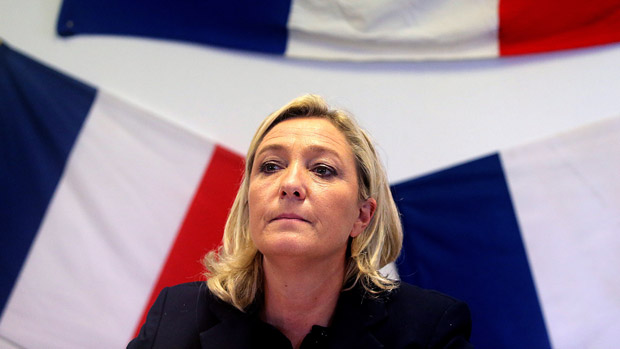Russia funds French National Front: is Moscow sowing European unrest?
Russia has also reportedly lent money to Greece’s neofascist Golden Dawn, Italy’s Northern League and other anti-Europe parties

A free daily email with the biggest news stories of the day – and the best features from TheWeek.com
You are now subscribed
Your newsletter sign-up was successful
Marine Le Pen has admitted that her far-right Front National accepted money from a Russian bank, amid growing evidence that the Kremlin is backing anti-European parties across the continent.
Le Pen said that her party had received a loan of €9 million (£7 million) in September from the Russian-owned First Czech-Russian Bank, but insisted that the money would have no impact on her policies.
“We signed with the First [bank] who agreed and we’re very happy about it,” she said. But it is “ridiculous to suggest that gaining a loan would determine our international position,” she insisted. “These insinuations are outrageous and offensive.”
The Week
Escape your echo chamber. Get the facts behind the news, plus analysis from multiple perspectives.

Sign up for The Week's Free Newsletters
From our morning news briefing to a weekly Good News Newsletter, get the best of The Week delivered directly to your inbox.
From our morning news briefing to a weekly Good News Newsletter, get the best of The Week delivered directly to your inbox.
According to recent opinion polls, the National Front is now France’s most popular party.
Russian loans have also been extended to Greece’s neofascist Golden Dawn party, Belgium’s Vlaams Belang, Italy’s Northern League, Hungary’s Jobbik and the Freedom Party of Austria, The Times reports. All of these parties except Golden Dawn were invited to observe Crimea's vote on joining Russia and all offered their support for the annexation of the south-eastern Ukrainian region.
The loans to the National Front from the Russian-owned bank occurred amid "growing evidence of a secret Kremlin campaign to buy influence in European politics," The Times says.
French politician Bruno Le Maire, a former cabinet minister who is running for the leadership of the centre-right Union for a Popular Movement, said that it was inconceivable that the loans would have no impact on Le Pen's attitude to Russia: “You are always under obligation to your creditor,” he said.
A free daily email with the biggest news stories of the day – and the best features from TheWeek.com
France’s National Front has "long struggled to raise the cash needed to match its political ambitions," France 24 reports. The party's treasurer Wallerand de Saint-Just said that the loans would be used to finance campaigning expenses in the lead up to the French national elections in 2017, for which the party would need approximately "30 to 40 million euros".
Last month, Vincent Jauvert claimed in the French weekly magazine Le Nouvel Observateur that National Front leaders had been in regular communication with the Russian ambassador in Paris, Alexander Orlov.
"The Kremlin has been betting on the National Front," Jauvert said. "It considers the party able to take power in France and potentially reverse the course of European history in favour of Moscow".
-
 Political cartoons for February 19
Political cartoons for February 19Cartoons Thursday’s political cartoons include a suspicious package, a piece of the cake, and more
-
 The Gallivant: style and charm steps from Camber Sands
The Gallivant: style and charm steps from Camber SandsThe Week Recommends Nestled behind the dunes, this luxury hotel is a great place to hunker down and get cosy
-
 The President’s Cake: ‘sweet tragedy’ about a little girl on a baking mission in Iraq
The President’s Cake: ‘sweet tragedy’ about a little girl on a baking mission in IraqThe Week Recommends Charming debut from Hasan Hadi is filled with ‘vivid characters’
-
 Putin’s shadow war
Putin’s shadow warFeature The Kremlin is waging a campaign of sabotage and subversion against Ukraine’s allies in the West
-
 Alexei Navalny and Russia’s history of poisonings
Alexei Navalny and Russia’s history of poisoningsThe Explainer ‘Precise’ and ‘deniable’, the Kremlin’s use of poison to silence critics has become a ’geopolitical signature flourish’
-
 What happens now that the US-Russia nuclear treaty is expiring?
What happens now that the US-Russia nuclear treaty is expiring?TODAY’S BIG QUESTION Weapons experts worry that the end of the New START treaty marks the beginning of a 21st-century atomic arms race
-
 Epstein files topple law CEO, roil UK government
Epstein files topple law CEO, roil UK governmentSpeed Read Peter Mandelson, Britain’s former ambassador to the US, is caught up in the scandal
-
 Iran and US prepare to meet after skirmishes
Iran and US prepare to meet after skirmishesSpeed Read The incident comes amid heightened tensions in the Middle East
-
 Israel retrieves final hostage’s body from Gaza
Israel retrieves final hostage’s body from GazaSpeed Read The 24-year-old police officer was killed during the initial Hamas attack
-
 China’s Xi targets top general in growing purge
China’s Xi targets top general in growing purgeSpeed Read Zhang Youxia is being investigated over ‘grave violations’ of the law
-
 Ukraine, US and Russia: do rare trilateral talks mean peace is possible?
Ukraine, US and Russia: do rare trilateral talks mean peace is possible?Rush to meet signals potential agreement but scepticism of Russian motives remain
